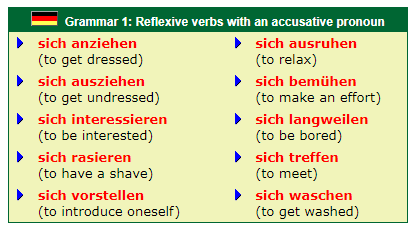Definition
In most sentences with objects, the subject and the object are two different people or things - e.g. Ich sehe ihn ("I see him").
Sometimes however a verb's subject and object are the same person or thing. Such verbs are called reflexive. In English, reflexive verbs end in "-self" or "-selves" - e.g. "I hurt myself", "she flatters herself", "they're giving themselves a break".
Not all German reflexive verbs however can be translated by "-self". In fact, whilst most English reflexive verbs are also reflexive in German, there are a number of German reflexive verbs that are not reflexive in English. Some of them have English equivalents which use "get" (i.e. to get dressed, to get washed, to get shaved), wheras some of them describe physical actions for which we do not use a reflexive verb. Many other German reflexive verbs however do not fall into either of these two categories (i.e. to be interested, to relax).
The infinitive of a German reflexive verb
German reflexive verbs consist of a simple verb together with the reflexive pronoun in the accusative or (in certain circumstances) the dative case. In the infinitive form, the reflexive pronoun (sich) precedes the verb itself.
Here is the infinitive form of the reflexive verbs taking an accusative pronoun which we have encountered in this and earlier chapters:

Notes
1. The verb treffen (= to meet) is only used reflexively in the plural. In this context, the reflexive pronoun denotes reciprocity and is the equivalent of each other:
Wir treffen uns morgen. (We will meet each other tomorrow.)
Wo treffen sie sich? (wher are they meeting each other?)
We will meet more reflexive verbs of this sort in subsequent chapters.
2. When using sich interessieren, you should employ the preposition für followed by a noun in the accusative case to say what it is that you are interested in. If your interest is an activity, you should express this by using the infinitive of the German verb, spelling it with a capital letter. This is called a verbal noun.
Paula interessiert sich für Fußball. (Paula is interested in football.)
Interessieren Sie sich für Lesen? (Are you interested in reading?)  英语
英语 日语
日语 韩语
韩语 法语
法语 西班牙语
西班牙语 意大利语
意大利语 阿拉伯语
阿拉伯语 葡萄牙语
葡萄牙语 越南语
越南语 俄语
俄语 芬兰语
芬兰语 泰语
泰语 丹麦语
丹麦语 对外汉语
对外汉语

